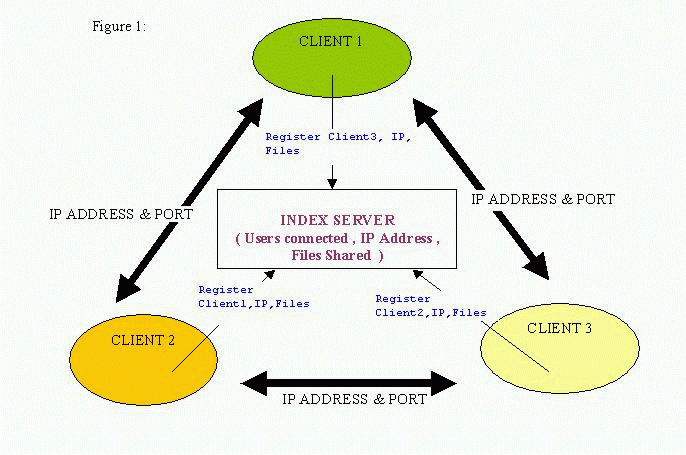盡管有許多P2P網絡不需要索引服務器或中央服務器,各客戶機之間可以互相直接通訊,但下面的圖1還是顯示了P2P網絡的基本工作原理,一般來說,P2P概念中包含一台中央索引服務器,這台服務器並不存儲有任何文件,它只存儲有登錄到該網絡上的所有用戶的信息、客戶端的IP地址以及用戶提供的供共享的文件,客戶機和服務器使用簡單的命令通過報路連接進行通訊。
當客戶端A想要查找P2P網絡上其他客戶端提供共享的文件時,系統會執行下面的操作:
·客戶端A以自己的用戶名登錄到索引服務器上。
·客戶端A向服務器注冊自己想提供給其他用戶共享的文件,以便其他用戶能夠查找到這些文件。
·客戶端A向服務器發出申請,查找與一定的輸入模式相匹配的文件。
·索引服務器在其數據庫中搜索給定的文件名,並將搜索到的如下的結果返回給客戶端A:
·提供該文件的客戶端,例如客戶端B。
·該用戶的IP地址。
·它搜索到的文件名。
一旦客戶端A選擇了下載選項,客戶端A就使用搜索返回的IP地址與客戶端B建立連接。
·一旦成功地建立起一個連接,就可以通知對方開始發送文件了。
·下載完成後,應當向索引服務器注冊你得到的共享文件的拷貝。
這樣的P2P網絡可以用來共享任何類型的文件,它既可以用在局域網上,也可以作在互聯網上。

(圖1)
public MyTcpListener(int port) : base(port)
{
}
public void StopMe()
{
if ( this.Server != null )
{
this.Server.Close();
} }
}
public class Transfer
{
MyTcpListener tcpl;
public Transfer()
{
OptionsLoader ol = new OptionsLoader();
int port = 8081;
if (ol.Port > 0)
{ port = ol.Port;
} else
{ port = 8081;
} this.tcpl = new MyTcpListener(port);
}
public void TransferShutdown()
{ tcpl.StopMe();
}
public void ListenForPeers()
{ try
{
Encoding ASCII = Encoding.ASCII;
tcpl.Start();
while (true)
{
// 在有連接之前,Accept將處於阻塞狀態
Socket s = tcpl.AcceptSocket();
NetworkStream DataStream = new NetworkStream(s);
String filename;
Byte[] Buffer = new Byte[256];
DataStream.Read(Buffer, 0, 256);
filename = Encoding.ASCII.GetString(Buffer);
StringBuilder sbFileName = new StringBuilder(filename);
StringBuilder sbFileName2 = sbFileName.Replace("\", "\\");
FileStream fs = new FileStream(sbFileName2.ToString(), FileMode.Open, FileAccess.Read);
BinaryReader reader = new BinaryReader(fs);
byte[] bytes = new byte[1024];
int read;
while((read = reader.Read(bytes, 0, bytes.Length)) != 0)
{
DataStream.Write(bytes, 0, read);
}
reader.Close();
DataStream.Flush();
DataStream.Close();
}
}
catch(SocketException ex)
{
MessageBox.Show(ex.ToString());
}
} public void DownloadToClient(String server, string remotefilename, string localfilename)
{
try
{
TcpClient tcpc = new TcpClient();
Byte[] read = new Byte[1024];
OptionsLoader ol = new OptionsLoader();
int port = 0;
if (ol.Port > 0)
{
port = ol.Port;
}
else
{
// 缺省的端口號,可以設置為使用的端口號
port = 8081;
}
// 嘗試與服務器連接
IPHostEntry IPHost = Dns.Resolve(server);
string []aliases = IPHost.Aliases;
IPAddress[] addr = IPHost.AddressList;
IPEndPoint ep = new IPEndPoint(addr[0], port);
tcpc.Connect(ep);
// 獲得流對象
Stream s = tcpc.GetStream();
Byte[] b = Encoding.ASCII.GetBytes(remotefilename.ToCharArray());
s.Write( b, 0, b.Length );
int bytes;
FileStream fs = new FileStream(localfilename, FileMode.OpenOrCreate);
BinaryWriter w = new BinaryWriter(fs);
// 讀取流對象,並將其轉換為ASCII碼
while( (bytes = s.Read(read, 0, read.Length)) != 0)
{
w.Write(read, 0, bytes);
read = new Byte[1024];
}
tcpc.Close();
w.Close();
fs.Close();
}
catch(Exception ex)
{
throw new Exception(ex.ToString());
} } }
}